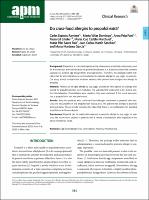| dc.contributor | Consorci Sanitari de Terrassa |
| dc.contributor.author | Espinós Ramírez, Carles |
| dc.contributor.author | PEIG-FONT, ANNA |
| dc.contributor.author | Gil Esteller, Paula |
| dc.contributor.author | Castillo Marchuet, María José |
| dc.contributor.author | Martinez García, Maria |
| dc.contributor.author | VIÑAS DOMINGO, MARTA |
| dc.contributor.author | Saura Foix, María del Pilar |
| dc.date.accessioned | 2023-06-22T10:04:19Z |
| dc.date.available | 2023-06-22T10:04:19Z |
| dc.date.issued | 2022-10 |
| dc.identifier.citation | Espinós Ramírez C, Viñas Domingo M, Peig Font A, Gil Esteller P, Castillo Marchuet MJ, Saura Foix MP, et al. Do cross-food allergies to propofol exist?. Anesth Pain Med. 2022 Oct;17(4):381-85. |
| dc.identifier.issn | 2383-7977 |
| dc.identifier.uri | https://hdl.handle.net/11351/9857 |
| dc.description | Alergia a la comida; Sensibilización alimentaria; Propofol |
| dc.language.iso | eng |
| dc.publisher | Korean Society of Anesthesiologists |
| dc.relation.ispartofseries | Anesthesia and Pain Medicine;17(4) |
| dc.rights | Attribution-NonCommercial 4.0 International |
| dc.rights.uri | http://creativecommons.org/licenses/by-nc/4.0/ |
| dc.source | Scientia |
| dc.subject | Propofol |
| dc.subject | Al·lèrgia alimentària |
| dc.subject.mesh | Propofol |
| dc.subject.mesh | Food Hypersensitivity |
| dc.title | Do cross-food allergies to propofol exist? |
| dc.type | info:eu-repo/semantics/article |
| dc.identifier.doi | 10.17085/apm.22195 |
| dc.subject.decs | propofol |
| dc.subject.decs | hipersensibilidad a los alimentos |
| dc.relation.publishversion | https://doi.org/10.17085/apm.22195 |
| dc.type.version | info:eu-repo/semantics/publishedVersion |
| dc.audience | Professionals |
| dc.contributor.authoraffiliation | [Espinós Ramírez C, Peig Font A, Gil Esteller P, Martinez García M] Servei d’Anestesiologia, Hospital de Terrassa, Consorci Sanitari de Terrassa, Terrassa, Spain. Universitat Internacional de Catalunya, Barcelona, Spain. [Viñas Domingo M, Castillo Marchuet MJ, Saura Foix MP] Servei d’Anestesiologia, Hospital de Terrassa, Consorci Sanitari de Terrassa, Terrassa, Spain |
| dc.identifier.pmid | 36317430 |
| dc.rights.accessrights | info:eu-repo/semantics/openAccess |

 Área privada
Área privada Contacto
Contacto







